七年级第5期英语周报(GZ)参考答案
七年级期中英语周报(GZ)答案解析
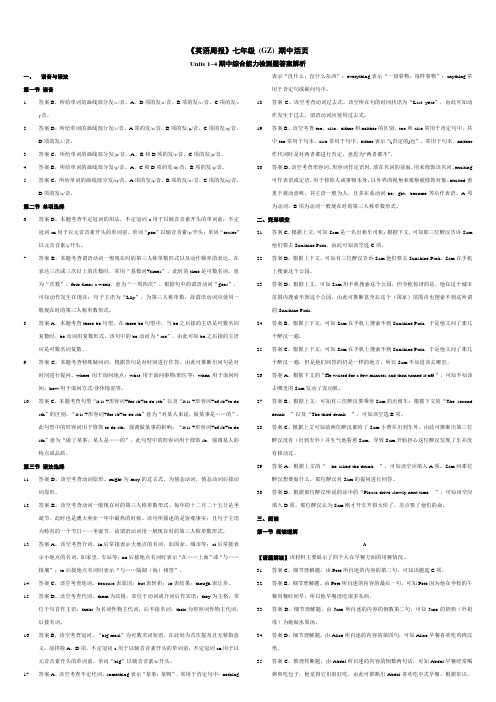
《英语周报》七年级(GZ) 期中活页Units 1~4期中综合能力检测题答案解析一、语音与语法第一节语音1.答案B。
所给单词的画线部分发/ɔː/音。
A、D项的发/ɒ/音,B项的发/ɔː/音,C项的发/ɔɪ/音。
2.答案D。
所给单词的画线部分发/iː/音。
A项的发/e/音,B项的发/ɪə/音,C项的发/eɪ/音,D项的发/iː/音。
3.答案C。
所给单词的画线部分发/ɪz/音。
A、B和D项的发/z/音,C项的发/ɪz/音。
4.答案B。
所给单词的画线部分发/g/音。
A、C和D项的发/dʒ/音,B项的发/g/音。
5.答案C。
所给单词的画线部分发/eɪ/音。
A项的发/ə/音,B项的发/ɑː/音,C项的发/eɪ/音,D项的发/e/音。
第二节单项选择6.答案D。
本题考查不定冠词的用法。
不定冠词a用于以辅音音素开头的单词前;不定冠词an用于以元音音素开头的单词前。
单词“pen”以辅音音素/p/开头;单词“eraser”以元音音素/ɪ/开头。
7.答案B。
本题考查谓语动词一般现在时的第三人称单数形式以及动作频率的表达。
在表达三次或三次以上的次数时,常用“基数词+times”,此时的time是可数名词,意为“次数”。
four times a week,意为“一周四次”。
根据句中的谓语动词“goes”,可知动作发生在现在;句子主语为“Lily”,为第三人称单数,故谓语动词应使用一般现在时的第三人称单数形式。
8.答案A。
本题考查there be句型。
在there be句型中,当be之后接的主语是可数名词复数时,be动词用复数形式。
该句中的be动词为“are”,由此可知be之后接的主语应是可数名词复数。
9.答案C。
本题考查特殊疑问词。
根据答句是对时间进行作答,由此可推断出问句是对时间进行提问。
where用于询问地点;what用于询问事物/职位等;when用于询问时间;how用于询问方式/身体情况等。
10.答案C。
本题考查句型“it is +形容词+for sb+to do sth”以及“it is +形容词+of sb+to dosth”的区别。
英语周报初一2020一2021全部答案
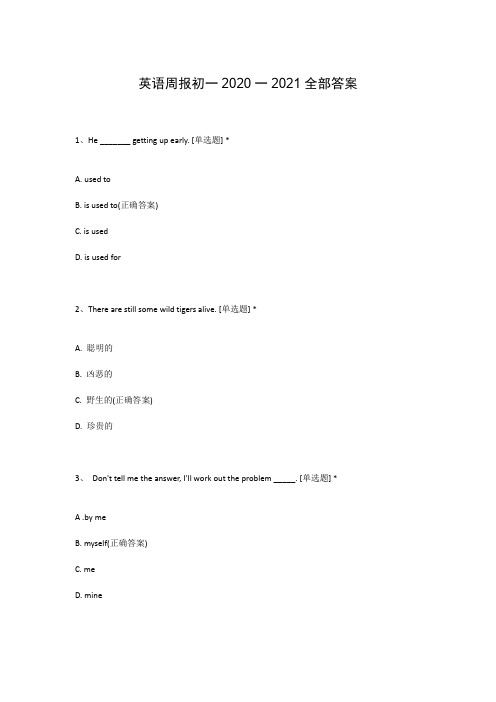
英语周报初一2020一2021全部答案1、He _______ getting up early. [单选题] *A. used toB. is used to(正确答案)C. is usedD. is used for2、There are still some wild tigers alive. [单选题] *A. 聪明的B. 凶恶的C. 野生的(正确答案)D. 珍贵的3、Don't tell me the answer, I'll work out the problem _____. [单选题] *A .by meB. myself(正确答案)C. meD. mine4、Tom and Mary's house bought last year is()Lucy, s. [单选题] *A. the three size ofB. three times the size of(正确答案)C. as three times large asD. three times as larger as5、We sent our children to school to prepare them for the time _____ they will have to work for themselves. [单选题] *A. thatB. when(正确答案)C. whileD. as6、This kind of banana tastes very _______. [单选题] *A. nice(正确答案)B. wellC. nicelyD. better7、Mary wanted to travel around the world all by herself, but her parents did not _______ her to do so. [单选题] *A. forbidB. allowC. follow(正确答案)D. ask8、He used to get up at six in the morning,()? [单选题] *A. used heB. did heC. didnt he (正确答案)D. should he9、( ) The Great Wall was listed by the UNESCO as ___ World Heritage Site. [单选题]*A. a(正确答案)B. theC.\D.an10、He made ______ for an old person on the bus. [单选题] *A. room(正确答案)B. roomsC. a roomD. some rooms11、We should _______ a hotel before we travel. [单选题] *A. book(正确答案)B. liveC. stayD. have12、Jim is a(n) _______. He is very careful and likes to work with numbers. [单选题] *A. secretaryB. tour guideC. accountant(正确答案)D. English teacher13、—What do you think of Animal World? —______. I watch it every day.()[单选题] *A. I don’t mind it.B. I like it.(正确答案)C. I can’t stand it.D. I don’t like it.14、_______ hard, _______ you’ll fail in the exam. [单选题] *A. Studying; forB. Study; or(正确答案)C. To study; andD. Study; and15、( ) --------Please take my seat here.-------- __________________________. [单选题]*A. That is nice of you(正确答案)B. I think it is my seatC. No, you sit hereD. I don’t think it’s a good seat.16、So many people will _______ to their work after the Spring Festival. [单选题] *A. get inB. get onC. get offD. get back(正确答案)17、You can _______ Bus 116 to get there. [单选题] *A. byB. take(正确答案)C. onD. in18、He doesn’t smoke and hates women _______. [单选题] *A. smokesB. smokeC. smokedD. smoking(正确答案)19、—Mum, could you buy a schoolbag ______ me when you go shopping?—No problem.()[单选题] *A. ofB. toC. inD. for(正确答案)20、These plastics flowers look so_____that many people think they are real. [单选题] *A.beautifulB.artificialC.natural(正确答案)D.similar21、—What’s the matter with that boy?—______.()[单选题] *A. He is watching TV in his roomB. He takes his temperatureC. He was playing a toy carD. He hurt his right leg(正确答案)22、29.______ my free time, I like listening to music. [单选题] * A.AtB.OnC.In(正确答案)D.About23、I?have to?_______ my younger brother on Sunday. [单选题] *A. look after(正确答案)B. look upC. take careD. look out24、Our campus is _____ big that we need a bike to make it. [单选题] *A. veryB. so(正确答案)C. suchD. much25、The story has _______ a lot of students in our class. [单选题] *A. attracted(正确答案)B. attackedC. appearedD. argued26、You can't see many _____ in a hospital. [单选题] *A. man nurseB. men nurses(正确答案)C. men nurseD. man nurses27、Now he is _______ his homework. [单选题] *A. busyB. busy with(正确答案)C. busy with doingD. busy does28、He runs so fast that no one can _______ him. [单选题] *A. keep upB. keep awayC. keep up with(正确答案)D. keep on29、You are getting too old for football.You had better _____tennis instead. [单选题] *A.take up(正确答案)B.take inC.take forD.take over30、There ______ a football match and a concert this weekend.()[单选题] *A. isB. haveC. will be(正确答案)D. will have。
七年级第21期英语周报(GZ)参考答案与解析

17.答案A。该空考查形容词。“feel” 为 系动词,后常接形容词作表语。常 见的系动词还有:be,look, seem,smell,taste,sound等。 18.答案D。该空考查介词。在英文 中,常用“by+交通工具”表示交 通方 式。by bus意为“乘坐公共汽车”。 七年级第21期 第2-4版
七年级第21期 第2-4版
3.答案D。D项的画线部分发/ɒ/音,其 他项的发/ə/音。 4.答案B。B项的画线部分发/ə/音,其 他项的发/ɜː/音。 5.答案D。D项的画线部分发/v/音,其 他项的发/f/音。
七年级第21期 第2-4版
第二节 单项选择 6.答案C。本题考查if引导的条件状语 从句。当主句的动作或状态表示可能 的结果时,主句的谓语动词用一般将 来时,if引导的条件状语从句的谓语 动词用一般现在时,即“主将从现”。
23.答案C。根据下文老鼠对狮子说的 “‘Do not kill me …”,可知生气 的狮 子要杀了老鼠。 24.答案B。根据下文老鼠对狮子说的 求饶的话,可知老鼠在听到狮子要 杀了他之后,非常害怕。
七年级第21期 第2-4版
25.答案C。根据下文狮子反问老鼠的 话“‘You can help me …”,可知 老 鼠求狮子放他一马,说日后他可能 会帮到他。 26.答案D。根据上文的“The lion laughed …”,可知狮子在听到老鼠 说他日后可能会帮到他后笑了,觉 得这是很搞笑的。 七年级第21期 第2-4版
27.答案D。根据第一段第一句,可知 该故事发生在一个森林里,故选D 项。 28.答案C。根据上文的“… the lion was caught in the net.”,可知狮子 被猎人布下的网给困住了,由此可 知老鼠看到狮子时,狮子不能动弹。
七年级第17期英语周报(GZ)答案解析
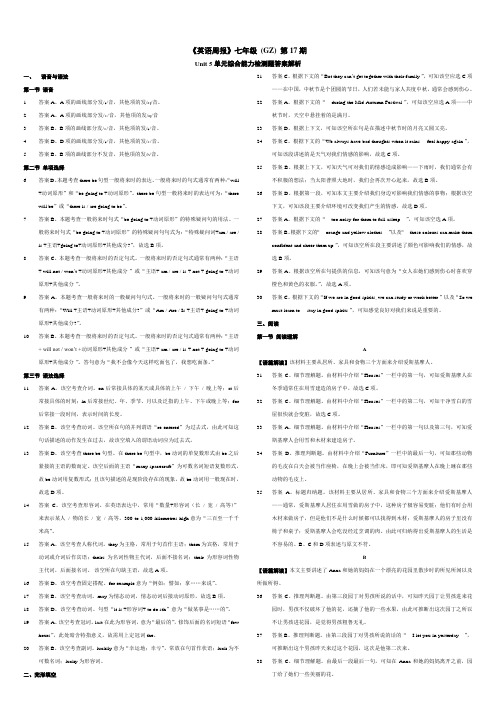
《英语周报》七年级(GZ) 第17期Unit 5单元综合能力检测题答案解析一、语音与语法第一节语音1.答案A。
A项的画线部分发/ə/音,其他项的发/eɪ/音。
2.答案A。
A项的画线部分发/ɜː/音,其他项的发/eɪ/音3.答案B。
B项的画线部分发/ɜː/音,其他项的发/ə/音。
4.答案D。
D项的画线部分发/ə/音,其他项的发/ɜː/音。
5.答案B。
B项的画线部分不发音,其他项的发/h/音。
第二节单项选择6.答案D。
本题考查there be句型一般将来时的表达。
一般将来时的句式通常有两种:“will+动词原形”和“be going to +动词原形”。
there be句型一般将来时的表达可为:“there will be”或“there is / are going to be”。
7.答案B。
本题考查一般将来时句式“be going to +动词原形”的特殊疑问句的用法。
一般将来时句式“be going to +动词原形”的特殊疑问句句式为:“特殊疑问词+am / are / is +主语+going to+动词原形+其他成分?”,故选B项。
8.答案C。
本题考查一般将来时的否定句式。
一般将来时的否定句式通常有两种:“主语+ will not / won’t +动词原形+其他成分.”或“主语+ am / are / is + not + going to +动词原形+其他成分.”。
9.答案A。
本题考查一般将来时的一般疑问句句式。
一般将来时的一般疑问句句式通常有两种:“Will +主语+动词原形+其他成分?”或“Am / Are / Is +主语+ going to +动词原形+其他成分?”。
10.答案B。
本题考查一般将来时的否定句式。
一般将来时的否定句式通常有两种:“主语+ will not / won’t +动词原形+其他成分.”或“主语+ am / are / is + not + going to +动词原形+其他成分.”。
英语周报七年级(GZ)第3期答案解析
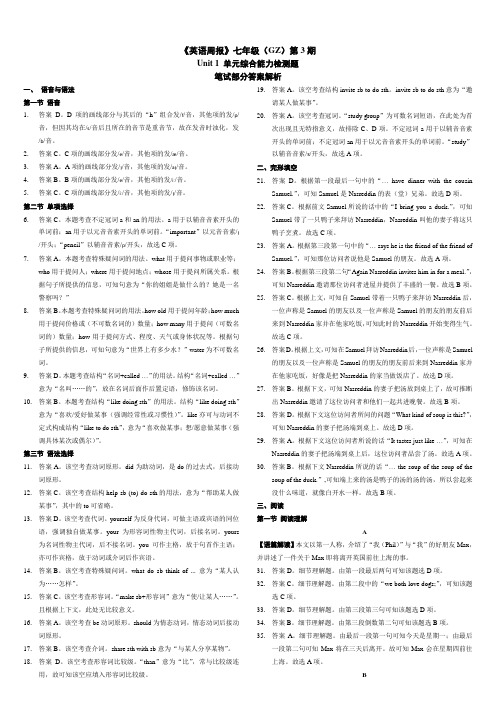
《英语周报》七年级(GZ)第3期Unit 1 单元综合能力检测题笔试部分答案解析一、语音与语法第一节语音1.答案D。
D项的画线部分与其后的“h”组合发/f/音,其他项的发/p/音,但因其均在/s/音后且所在的音节是重音节,故在发音时浊化,发/b/音。
2.答案C。
C项的画线部分发/e/音,其他项的发/æ/音。
3.答案A。
A项的画线部分发/ɪ/音,其他项的发/aɪ/音。
4.答案B。
B项的画线部分发/e/音,其他项的发/iː/音。
5.答案C。
C项的画线部分发/iː/音,其他项的发/ɪ/音。
第二节单项选择6.答案C。
本题考查不定冠词a和an的用法。
a用于以辅音音素开头的单词前;an用于以元音音素开头的单词前。
“important”以元音音素/ɪ/开头;“pencil”以辅音音素/p/开头,故选C项。
7.答案A。
本题考查特殊疑问词的用法。
what用于提问事物或职业等;who用于提问人;where用于提问地点;whose用于提问所属关系。
根据句子所提供的信息,可知句意为“你的姐姐是做什么的?她是一名警察吗?”8.答案B。
本题考查特殊疑问词的用法。
how old用于提问年龄;how much用于提问价格或(不可数名词的)数量;how many用于提问(可数名词的)数量;how用于提问方式、程度、天气或身体状况等。
根据句子所提供的信息,可知句意为“世界上有多少水?”water为不可数名词。
9.答案D。
本题考查结构“名词+called …”的用法。
结构“名词+called …”意为“名叫……的”,放在名词后面作后置定语,修饰该名词。
10.答案B。
本题考查结构“like doing sth”的用法。
结构“like doing sth”意为“喜欢/爱好做某事(强调经常性或习惯性)”。
like亦可与动词不定式构成结构“like to do sth”,意为“喜欢做某事;想/愿意做某事(强调具体某次或偶尔)”。
第三节语法选择11.答案A。
英语周报参考答案七上
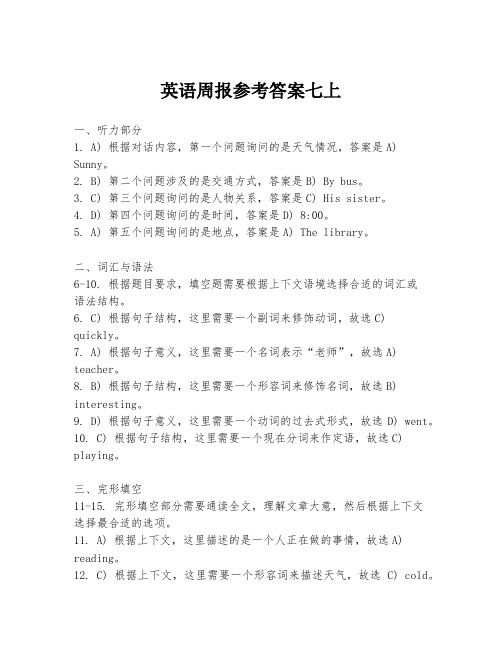
英语周报参考答案七上一、听力部分1. A) 根据对话内容,第一个问题询问的是天气情况,答案是A) Sunny。
2. B) 第二个问题涉及的是交通方式,答案是B) By bus。
3. C) 第三个问题询问的是人物关系,答案是C) His sister。
4. D) 第四个问题询问的是时间,答案是D) 8:00。
5. A) 第五个问题询问的是地点,答案是A) The library。
二、词汇与语法6-10. 根据题目要求,填空题需要根据上下文语境选择合适的词汇或语法结构。
6. C) 根据句子结构,这里需要一个副词来修饰动词,故选C) quickly。
7. A) 根据句子意义,这里需要一个名词表示“老师”,故选A) teacher。
8. B) 根据句子结构,这里需要一个形容词来修饰名词,故选B) interesting。
9. D) 根据句子意义,这里需要一个动词的过去式形式,故选D) went。
10. C) 根据句子结构,这里需要一个现在分词来作定语,故选C) playing。
三、完形填空11-15. 完形填空部分需要通读全文,理解文章大意,然后根据上下文选择最合适的选项。
11. A) 根据上下文,这里描述的是一个人正在做的事情,故选A) reading。
12. C) 根据上下文,这里需要一个形容词来描述天气,故选C) cold。
13. B) 根据上下文,这里需要一个名词来表示地点,故选B) park。
14. D) 根据上下文,这里需要一个动词的过去式来描述过去发生的事情,故选D) lost。
15. C) 根据上下文,这里需要一个副词来修饰动词,故选C) suddenly。
四、阅读理解A. 根据文章内容,选择正确答案。
16. B) 根据文章第一段,可知正确答案是B) He likes playing computer games.17. C) 根据文章第二段,可知正确答案是C) He is a middle school student.18. A) 根据文章第三段,可知正确答案是A) He wants to be a computer programmer.B. 根据文章内容,选择正确答案。
英语周报七年级下册unit5作文答案

英语周报七年级下册Unit 5作文答案的深度解析与仿写In the world of English learning, the Weekly English Newspaper for Grade 7 students plays a pivotal role. Unit 5 of this newspaper offers a window into the rich tapestry of language and culture. The focus of this unit is not just on acquiring new vocabulary or grammar rules, but also on developing critical thinking skills and enhancing cultural understanding.The composition prompt within Unit 5 challenges students to delve into the topic of "Changes in My Hometown" and explore the transformations that have occurred over time. This task not only allows students to exercise their descriptive writing abilities but also encourages them to reflect on the social and economic factors that have shaped their hometown's evolution.In the provided answer key, students are guided to structure their essays by beginning with a captivating introduction, followed by a detailed description of the changes they have observed. The essay then moves on to analyzing the reasons behind these changes and concludeswith a personal reflection on how these transformations have affected their lives.Let's delve deeper into the essay prompt and explore how we can craft an engaging and thought-provoking composition.**Introduction:**Begin your essay with a vivid portrayal of your hometown's past, painting a picture in the reader's mind of what it used to be like. Use descriptive language to evoke emotions and create a sense of nostalgia. For example:"Nestled in the heart of a lush green valley, my hometown was once a quiet, peaceful village. The streets were narrow and lined with traditional cottages, and theair was filled with the scent of fresh flowers and cooking fires. My childhood memories are deeply rooted in this idyllic setting."**Description of Changes:**Next, transition to the present and describe the transformations that have taken place in your hometown. Usespecific examples and compare them to the past toillustrate the extent of the changes. For instance:"As I returned to my hometown after years of absence, I was astonished by the transformation that had occurred. The narrow streets had been widened, and the traditional cottages had given way to modern apartment buildings. The bustling marketplace was now a well-organized shopping mall, and the old-fashioned transportation had been replaced by modern modes of conveyance. The once serene village had transformed into a thriving town."**Analysis ofReasons:**After describing the changes, delve into the reasons behind them. Explore the social, economic, andtechnological factors that have driven these transformations. For example:"The rapid pace of urbanization and industrialization has been the primary driving force behind these changes.The influx of new businesses and industries has attracted a influx of migrants, leading to a surge in population and subsequent urban sprawl. Technological advancements havealso played a pivotal role, as they have made it easier toconstruct modern infrastructure and facilities. Additionally, the government's policies and investmentshave supported the growth and development of the town."**Personal Reflection:**Conclude your essay with a personal reflection on how these changes have affected your life and your feelings towards your hometown. Use this opportunity to express your thoughts and emotions honestly. For instance:"While the changes in my hometown have brought about many positive developments, they have also left me with a sense of nostalgia. The familiar landmarks and traditionsof the past have been replaced by new ones, and while I appreciate the progress, I also miss the old, simpler times. Nevertheless, I am optimistic about the future of my hometown and excited to see what new transformations itwill undergo."In conclusion, the composition prompt in Unit 5 of the Weekly English Newspaper for Grade 7 students presents arich opportunity for students to exercise their writingskills while also gaining insights into their hometown's history and development. By following the structureoutlined in the answer key and delving into their personal experiences and reflections, students can create engaging and thought-provoking essays that capture the essence of the topic.。
七年级新目标英语周报答案
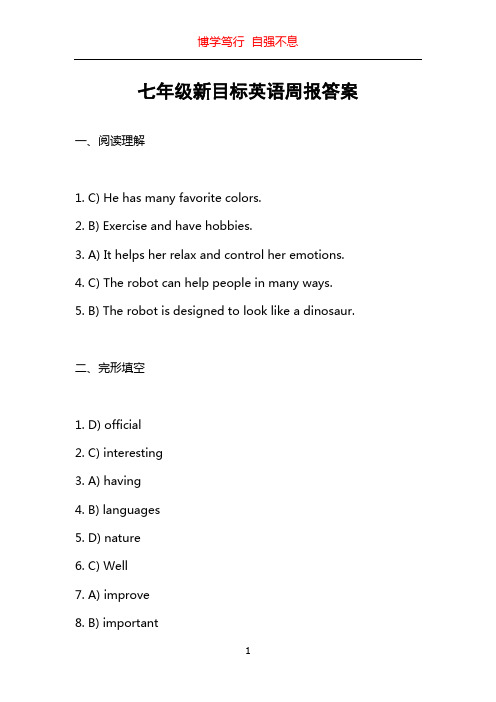
七年级新目标英语周报答案一、阅读理解1. C) He has many favorite colors.2. B) Exercise and have hobbies.3. A) It helps her relax and control her emotions.4. C) The robot can help people in many ways.5. B) The robot is designed to look like a dinosaur.二、完形填空1. D) official2. C) interesting3. A) having4. B) languages5. D) nature6. C) Well7. A) improve8. B) important9. C) writer10. A) choose三、词汇运用1. relatives2. imagine3. especially4. invented5. successful6. regularly7. thousands8. competition9. independent10. difference四、任务型阅读A) subjects1. P.E (Physical Education)2. English3. Art4. Music5. ScienceB) reasons1. helps students stay fit and healthy2. important for communication and future career opportunities3. helps develop creativity and self-expression4. encourages love for music and nurtures talent5. promotes scientific thinking and understanding of the world五、书面表达参考范文:The Importance of English LearningEnglish is one of the most widely spoken languages in the world and has become the language of communication in many international business and political settings. Learning English as a second language has become a necessity for many people. In this article, we will explore why English learning is important and how it can benefit us.First and foremost, learning English opens up a world of opportunities. In today's globalized society, English is the key to accessing information and knowledge. The majority of scientific research, literature, and internet content is in English. By mastering the English language, we can expand our horizons and access a wide range of resources that are not available in our native language.Moreover, English is the language of international business. Many multinational companies require their employees to have a good command of English in order to communicate with customers and business partners from different countries. Knowing English can improve our career prospects and increase our chances of securing a better job in the global job market.English learning also helps to develop important skills such as communication, critical thinking, and problem-solving. Through reading, writing, and speaking in English, we can enhance our ability to express ourselves clearly and effectively. This not only improves our communication skills but also boosts our confidence in social and professional situations.In addition, English learning provides us with a deeper understanding of different cultures and perspectives. English literature, movies, and music expose us to different ideas and ways of life. By immersing ourselves in the English language and culture, we become more tolerant and open-minded individuals.In conclusion, English learning is of great importance in our modern society. It opens up opportunities, improves career prospects, develops essential skills, and broadens our horizons. Therefore, it is crucial for students to dedicate time and effort to learning English in order to thrive in today's interconnected world.。
- 1、下载文档前请自行甄别文档内容的完整性,平台不提供额外的编辑、内容补充、找答案等附加服务。
- 2、"仅部分预览"的文档,不可在线预览部分如存在完整性等问题,可反馈申请退款(可完整预览的文档不适用该条件!)。
- 3、如文档侵犯您的权益,请联系客服反馈,我们会尽快为您处理(人工客服工作时间:9:00-18:30)。
二、1 cooks dinner 2. go to bed 3. gets up 4. junior high school 5. after school
七年级第5期 第3-4版
句型 1. Does, take part in 2. How long 3. doesn’t have lunch 4. How does, go
七年级第5期 第3-4版
三、1-5 BAACD 6-10 BDBCA
七年级第5期 第3-4版
篇章 1-5 DBACC
七年级第5期 第3-4版
《导写桥》 Step 1: 1. get up 2. go to school 3. on foot / walk 4. take part in 5. go to bed 6. have a good time / have fun / enjoy oneself
七年级牛津第5期参考答案
《短语收藏夹》 1. go to bed 2. get up 3. do morning exercises 4. have classes 5. a piece of
七年级第5期 第1版
【巩固练习】 一、1. arrives at 2. a piece of 3. a glass of 4. wash her face 5. has breakfast
2. doesn’t like 4. kisses 6. are
七年级第5期 第2版
频度副词 1-2 DC
七年级第5期 第2版
Unit 2 基础训练(二) Grammar 一、(1) is (3) washes (5) goes (7) is (9) doesn’t like 二、1-5 DDBAC
七年级第5期 第3-4版
back home at 5:30 p.m. After supper, I do my homework. I usually go to bed at 9:00 p.m. I always have a good time on my school days. I really enjoy my school life.
七年级第5期 第3-4版
语音 1-5 BDCAB
七年级第5期 第3-4版
语法 一、1-6 CBDBCA 二、1. Do, go, ride 2. get, has, visits 3. works, teaches 4. doesn’t like, doesn’t do 5. does, do, plays 6. does, go 7. Does, see, stays
七年级第5期 第1版
《语法梳理》 一般现在时 一、1. finishes 3. guesses 5. mixes 7. rains 9. carries
2. touches 4. flies 6. goes 8. stays
七年级第5期 第2版
二、1. pushes 3. show 5. Does, swim 7. Do, live
七年级第5期 第2版
dinner, she prepares her lessons. She sometimes helps Jason with his homework. She usually goes to bed at 11 p.m.
七年级第5期 第2版
Unit 2 单元知识专练 词汇 一、1. article 2. together 3. rings 4. Never 5. practice 6. break 7. market 8. band 9. seldom 10. Grade
七年级第5期 第3-4版
二、1. daily 3. bell 5. usually
2. guitar 4. table tennis 6. ends
七年级第5期 第3-4版
短语 一、1. prepares his lessons 2. is close to 3. arrive at 4. on foot 5. learn about 6. take part in 7. has a good time
七年级第5期 第3-4版
Step 2: After I have supper, I do my homework.
七年级第5期 第3-4版
Step 3: 上课日的日常生活,感受,第一, 一般现在时
七年级第5期 第3-4版
Step 4: One possible version: My school days I have a regular life on school days. I always get up at 6: 30 in the morning. After breakfast, I go to school on foot at 7:30. We have six classes a day. I love all the subjects and I study hard. I often take part in the school band practice after school. Then I go
(2) gets (4) brushes (6) walk (8) likes
七年级第5期 第2版
Speaking 一、1-3AAC 二、(1)-(5) CEADB
七年级第5期 第2版
More practice 一、1-5 BDCBB
七年级第5期 第2版
二、One possible version: Jason’s mother is a teacher. She gets up at 6 o’clock every day. She always arrives at school at 7:25 a.m. She usually has two lessons in the morning. After school, she plays volleyball with her students. In the evening, she cooks dinner. After
七年级第5期 第1版
二、1. helps, with / do 2. have claБайду номын сангаасses 3. go to bed 4. gets up 5. does morning exercises
七年级第5期 第1版
《知识点滴》 1. twice a month 2. How often 3. arrive at / get to 4. arrive / get here 5. help, with
七年级第5期 第3-4版
